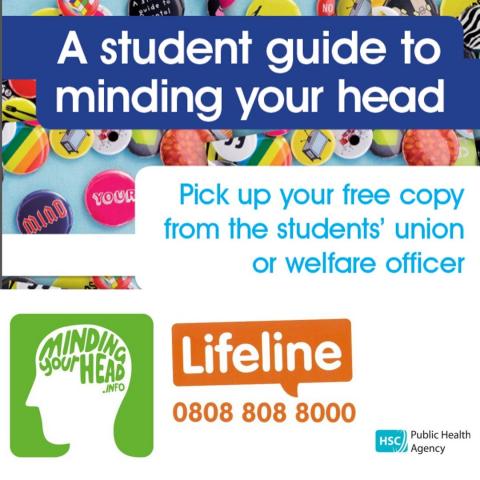Students urged to look after mental health

The Public Health Agency (PHA) is encouraging students to be aware of the importance of looking after their mental health as the new academic year gets under way, and to seek help if they need it.
Starting university or college can be a stressful experience for young people, many of whom are leaving home for the first time. It’s also a time for developing new friendships, learning how to manage study and lectures, budgeting, dealing with financial worries, coping with a new course and exam stress and the expectation to succeed.
A culmination of these pressures can sometimes lead to feelings of stress, anxiety and loneliness.
The PHA has developed a booklet ‘Mind Your Head: A student guide to mental health’ which is full of practical tips and information on managing stress and achieving and maintaining positive mental health and emotional wellbeing. The booklet is available from students’ unions across Northern Ireland. It was compiled with input from third level students and welfare officers.
It is also available at www.pha.site/myhstudents
Fiona Teague, Regional Lead for Mental Health Promotion in the PHA, said: “This month marks an exciting time for many young people as they head off to college or university. It can also be a huge period of change. Most of us go to university or college hoping that it will lead to a good job in the future.
In the shorter term though, for first year students in particular, they are usually focused on making new friends settling into a new place and finding their feet.
“Students can often get caught up in the hectic swirl of socialising, where drinking and nights out can take its toll both mentally and physically. All of these elements present challenges.
“It’s really important that students are aware that taking care of your mental health is just as important as looking after your physical health.
“Ignoring problems can make them seem worse. If you are feeling stressed or that you can’t cope, talk to someone you trust as soon as you can – as the saying goes, a problem shared is a problem halved.
“Taking the first step in telling someone how you are feeling may be hard, but it can make a big difference.”
The PHA has produced a number of directories that list organisations who offer services to help improve mental health and emotional wellbeing. Contact details for support which is available through universities and colleges are also included.
All the directories can be found on the PHA website by visiting www.pha.site/directories
If you or someone you know is in distress or despair, the freephone Lifeline helpline is available on 0808 808 8000. Trained crisis counsellors are available 24/7 to take your call and help you immediately. Lifeline is free to call from all landlines and mobiles. Lifeline counsellors can also help you support a friend in despair, with their permission, as the first call can be difficult for them to make when in distress. We would encourage everyone to save the Lifeline freephone number 0808 808 8000 into their phones.
For more information about the Lifeline service visit www.lifelinehelpline.info
It can be difficult to spot the signs of anxiety and stress, both in yourself or a friend. Signs of a potential mental health problem include:
- Change in mood
- Disturbed sleep
- Disturbed eating patterns
- Lack of care for personal appearance or personal responsibilities
- Unusual behaviour
- Recurrent physical symptoms
- Increased use of alcohol or other drugs
- Thinking/talking about not wanting to live
